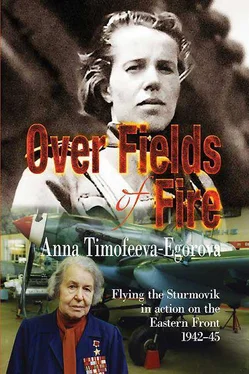Suddenly smoke burst from under the fuselage of the plane flying ahead of me. “Twenty one, twenty two, twenty three”… I count off three seconds. Oh, God how long they are! At last I press the trigger. Now come what may, I and the pilot ahead of me have done our job precisely. We haven’t turned off course and haven’t changed altitude. I want so much to see what’s happening down there on the ground, how the smoke screen is spread and if it has a gap anywhere but I can’t divert my attention. At last Kerov has turned right, to the east, and all the Sturmoviks are following him, and begin to climb up. Mission accomplished…
We were flying over the escort fighter’s aerodrome. In the headphones I heard Kerov’s voice — deep, smooth as his temper: “Thanks, little ones! You’ve done a excellent job!” he thanked the fighter pilots for escorting us.
My heart is rejoicing: we’re all coming back — all nineteen. Again there is a voice in the headphones: “Attention Hunchbacks!”
‘Hunchbacks’ meant us — it was a frontline nickname for the Sturmoviks , given for their cockpits standing out from the fuselage. I pricked up my ears.
“For successful completion of the mission”, we hear on the air, “and the fortitude shown, all the airmen who took part in setting the smoke-screen are awarded the Order of the Red Banner…”
Now it was quiet on the air. The Il’s engine was running smoothly. Here was our aerodrome. The one whose machine was most damaged was the first to close in for landing — this was our rule. Then all the others, including me, landed. Having taxied to the parking bay I turned the engine off and only then felt the deadly fatigue. The technician, the mechanic, the engine specialist, the armoury girl, the flyers who didn’t take part in the sortie, swarmed all over the cockpit like bees.
“Are you wounded, Comrade Lieutenant?” The armourer Dousya Nazarkina shouted.
“You’ve got blood on your face!”
“No”, I said, “My lips are cracked and bleeding.”
The mechanic shows me a huge hole in the left wing: “Lucky that the shell didn’t burst — otherwise you would have been blown to pieces. Look, the elevator trimmer is broken as well.”
And during the flight I hadn’t noticed my Il was damaged!
The regiment is lined up. The battle flag is brought out. We, who carried out the Front Command’s special mission, stand separately as though it were our name day. The 4th Aerial Army Commander General Vershinin expresses his gratitude to us for our excellent work and pins the Orders of the Red Banner on our chests. And in the evening there is another reward: the accursed Blue Line has been broken through by our troops! We are told that several minutes after we released the ‘smoke gas’ a white wall of smoke grew up in front of the enemy lines. It fully served its purpose. Moving towards the enemy the smoke screen covered the knots of resistance and made their infantry blind. Not knowing what was happening in front, the Hitlerites abandoned the frontline in a panic. Our troops broke through the lines and advanced a kilometer and a half to two kilometres straight away.
The life of the regiment went on its normal course. Fierce fighting on the Taman Peninsula continued. We had to fly combat missions several times a day, and most of the time we flew towards targets over the waters of the Black and Azov Seas.
I’d feared water since childhood and had always been a bad swimmer. And it seemed to me sometimes when flying over the sea that the engine was playing up. In case of emergency we had been issued with lifebelts but the airmen didn’t believe they would save us if we ditched on water. But I, like a drowning man clutching at a straw, would put the belt on without fail, to the jokes and laughter of my comrades, meticulously adjusting it to my figure. Of course by modern standards our lifebelts were far from perfect. Judge for yourself: when a shot-down plane falls into the sea, a pilot has to manage to open the cockpit, to bail out, then open the parachute and the valve on the life belt and wait until it filled up with gas produced by the contact of some chemical substance in it with water. And if the belt didn’t fill with gas, what then? That was why the airmen didn’t believe in the lifebelts. But when put on, it had a positive psychological effect on me, and therefore I paid no attention to the guys’ good-natured joking.
The regimental favourite Borya Strakhov didn’t come back after a sortie onto the Choushka Spit. A day later some seamen brought his body to our place and said it had been washed ashore near Anapa. We buried him with a Division lined-up, with all military honours in the Stanitsa of Dzhigitskaya. Airmen were rarely buried during the war because they usually died where the action was. I stood next to the coffin of Boris, wept bitterly and could not believe he was dead. It seemed he would get up any minute, look around with his grey-green eyes, twist his non-existent moustache and ask: “What are they taking girls to war for?” and would hand me a field flower. He used to do that often.
During his last combat sortie Boris led a sixer of Il-2s on a ground attack and bombing mission against a ferry carrying a troop train near the Choushka Spit. The Sturmoviks flew below the lower edge of clouds at a height of 700 metres. On approach to the target the pilots were surprised: the enemy didn’t open fire on the planes for some reason. Strakhov and his wingmen were aware that the enemy flak was zeroed in on the clouds’ lower edge beforehand and began to conduct wide anti-flak manoeuvres in course and altitude plane. The flak guns remained silent. The pilots wanted to see them sooner than later, to see the first shell bursts so as to know where to turn the planes but the sky was still clear right up to the clouds. But then Boris Strakhov noticed the ferry near the Choushka Spit — a steam-engine dragging the carriages was creeping off it. Judging by their silhouettes on the open trucks, there were tanks, artillery and vehicles under the tarpaulins, and probably ammunition in the covered carriages. As soon as the leader switched his plane to diving several flak batteries tore the skies with a powerful salvo. The pilots didn’t falter and maintained their rapid approach to the target, firing their cannons and machine-guns and launching rockets. The pilots dropped 100-kilogram bombs with delayed fuses from low altitude. In 22 seconds the fuses did their work and a dazzling blaze covered the whole Choushka Spit.
But when the group was on its way home and already flying over the Black Sea the pilots saw that the leader’s plane was badly damaged and losing height. Apparently Strakhov was wounded, for his radio was silent. And suddenly four Fokkers 125 125 Editor’s note — the classic nickname for German Focke Wulf Fw 190 fighters in Russian military slang. Indeed, it has nothing to do with the planes of the ‘Fokker’ design.
leaped out of the clouds. They pounced upon the leader’s plane like jackals. Strakhov sharply threw his plane up — possibly he wanted to let the Hitlerites pass forward and attack them himself but his plane was no longer controllable. Hitting the waves with a list, he went to the bottom…
So Boris Strakhov was no more — a fair-haired bloke from Gorky — the 1st Squadron Commander. Everyone in our regiment took his death hard but his friend Vanya Soukhoroukov suffered harder than anyone. Ivan lost weight, looked drawn and spent all his spare time at his friend’s grave. Just recently as an incentive Ivan had got permission to have a vacation at home. Before leaving he told me confidentially that he was leaving to marry his childhood girlfriend and asked me to ‘lend’ him my trench-coat, for his own was very old, soldier-issue. My trench-coat had been made up from English cloth in a Voentorg 126 126 Translator’s note — a network of special shops organised to supply military servicemen.
workshop. “Since you’re going to get married…” I agreed, “take it!”
Читать дальше












